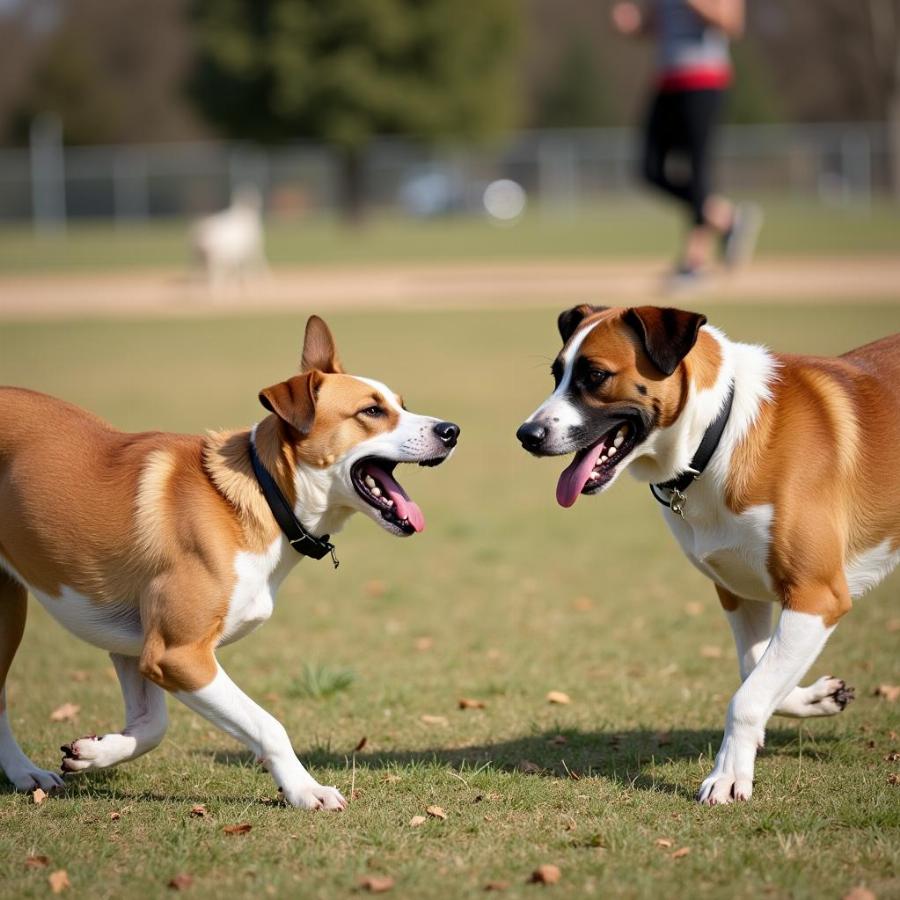Dog reactivity towards other dogs is a common behavioral issue that can manifest in various ways, from excited barking and lunging to fearful cowering and aggression. Understanding the underlying causes and employing effective training techniques are crucial for managing this behavior and ensuring a happy and harmonious life for both you and your reactive dog. This comprehensive guide will delve into the nuances of dog reactivity, offering practical advice and insights to help you navigate this challenging situation.
Many dog owners struggle with canine reactivity, wondering why their furry friend reacts so strongly to other dogs. This behavior can stem from various factors including fear, frustration, genetics, or past negative experiences. Identifying the root cause of your dog’s reactivity is the first step towards effective management and training. This article will explore these triggers, offer practical training tips, and provide valuable resources to help you address dog reactivity.  Chó phản ứng với chó khác
Chó phản ứng với chó khác
Decoding Dog Reactivity: What Does It Mean?
Dog reactivity encompasses a wide range of behaviors displayed when a dog encounters another dog. It’s important to differentiate reactivity from aggression. While a reactive dog might bark, lunge, or growl, it doesn’t necessarily mean they intend to harm another dog. Reactivity is often a fear-based response, a manifestation of anxiety or frustration. Understanding this distinction is crucial for tailoring an appropriate training approach.
Signs of Reactivity in Dogs
Recognizing the subtle signs of dog reactivity can help you intervene early and prevent escalation. These signs can include:
- Barking and Lunging: This is often the most noticeable sign of reactivity.
- Whining and Whimpering: Indicative of fear or anxiety.
- Growling and Snarling: Warning signals that should be taken seriously.
- Stiff Body Posture and Raised Hackles: Signs of heightened alertness and tension.
- Tucked Tail and Avoidance: Signs of fear and submission.
Understanding these signals allows you to anticipate your dog’s reactions and manage situations effectively.
Pinpointing the Triggers: Why are Some Dogs Reactive?
A multitude of factors can contribute to dog reactivity. Unraveling these underlying causes is paramount for developing a successful management plan.
Fear and Anxiety
Fear is a common driver of dog reactivity. A dog who has had a negative experience with another dog, such as being attacked or bullied, may develop fear-based reactivity. Similarly, dogs lacking early socialization may be anxious and uncertain around unfamiliar dogs, leading to reactive behaviors.
Frustration
Frustration-based reactivity often occurs when a dog is prevented from interacting with another dog. This can manifest as barking, lunging, and whining, especially on leash.
Genetics and Temperament
Certain breeds may be genetically predisposed to reactivity. While genetics play a role, proper training and socialization are still essential for managing these tendencies.
“Early socialization is paramount for preventing reactivity. Expose your puppy to a variety of dogs and environments in a positive and controlled manner,” advises Dr. Emily Carter, a certified veterinary behaviorist.
Managing and Modifying Reactive Behavior: A Step-by-Step Guide
Addressing dog reactivity requires a multi-faceted approach that combines management strategies and behavior modification techniques.
Management Techniques
Managing your dog’s environment is crucial for minimizing reactive episodes. This includes:
- Avoiding Known Triggers: Identify and avoid situations or locations where your dog is likely to react.
- Using Positive Reinforcement: Reward calm behavior around other dogs with treats and praise.
- Desensitization and Counterconditioning: Gradually expose your dog to triggers at a safe distance, pairing the exposure with positive experiences.
Training Techniques
Training plays a vital role in modifying reactive behavior. Consider working with a certified professional dog trainer experienced in reactivity.
- Obedience Training: A solid foundation in basic obedience commands like “sit,” “stay,” and “come” provides you with greater control over your dog’s behavior.
- Leash Training: Proper leash training can prevent pulling and lunging, making walks more enjoyable.
“Consistency and patience are key when working with a reactive dog. Celebrate small victories and remember that progress takes time,” adds Dr. Carter.
Conclusion
Dog reactivity is a complex issue, but with understanding, patience, and the right approach, you can help your dog overcome their reactivity and enjoy more positive interactions with other dogs. Remember that seeking professional guidance from a certified trainer or veterinary behaviorist is crucial for developing a tailored training plan. Don’t let reactivity define your dog’s life – empower them to navigate the canine world with confidence and ease.
FAQ
- Is dog reactivity the same as aggression? No, reactivity is a broader term encompassing various behaviors, while aggression implies an intent to harm.
- Can dog reactivity be cured? While complete “cure” may not always be possible, effective management and training can significantly reduce reactivity.
- How long does it take to train a reactive dog? The timeframe varies depending on the severity of the reactivity and the dog’s individual response to training.
- What should I do if my dog reacts to another dog on a walk? Create distance from the trigger, redirect your dog’s attention, and reward calm behavior.
- Is medication an option for reactive dogs? In some cases, medication may be recommended in conjunction with behavior modification. Consult with your veterinarian.
- Can a reactive dog ever go to dog parks? With proper training and management, some reactive dogs can eventually enjoy controlled social interactions in appropriate settings.
7.. What are some good places to walk dogs that are reactive? You could try quieter trails, or consider places to walk dogs that are less frequented.
Related Resources
For more information about dog walking and dog parks, check out these resources:
Beaut Dogs is your trusted source for all things canine, offering comprehensive and expert-driven insights into the world of dog ownership. We provide valuable information on various breeds, care tips, training advice, and much more. For personalized support and detailed answers to your dog-related questions, contact us at Email: [email protected]. We’re here to help you navigate the joys and challenges of dog ownership. Visit Beaut Dogs today!